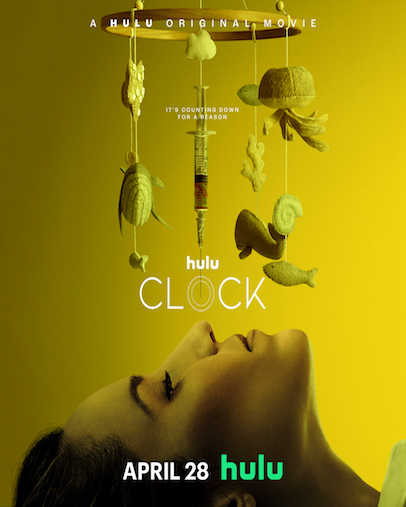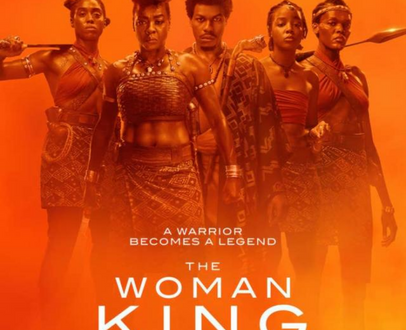Clock Movie 2023 Analysis | The Horrific Pressures of Societal Expectations
Clock is a fresh, creative take on the horrors of choosing to not have children in a society that expects it, nay, nearly demands it of you.
This suspenseful, uncomfortable, and crafty take on falling prey to societal pressures sends a clear message to viewers that making life decisions based on pleasing others is a surefire street to self-destruction. If you enjoy psychological thrillers like Don’t Worry Darling then Clock is the movie for you.
Clock Movie 2023 Analysis

Ella and her husband Aiden are living a beautiful, successful, child-free life. However, when the pressure of her pregnant friends and her widower father make her question why at 38, she still doesn’t desire to have children, Ella opts to take part in a sinister clinical trial that promises to fix her inability to feel her biological clock ticking.
**Heads Up There WILL be spoilers in this review.**
Clock Hulu Spoilers
Clock immediately sets the eerie tone in the opening scene, showing a woman standing on the seat of a swingset as the chains creak back and forth. As we zoom closer to the lady, we see that she has a pool of blood streaming down her legs.
Clearly deeply distressed, this woman uses the last of her strength to pull herself to the top of the swing set and wrap the chains around her neck. The last image we see is her lifeless legs and a metal ringlike accessory dropped into the pool of her blood.
Without further knowledge of the film, I’d assumed that this woman was suffering from a miscarriage and I had thought that maybe the metal accessory was a tiny clock, a symbol of the end of this woman’s fertility.
Well, spoiler alert, as the protagonist, Ella, goes on her harrowing journey toward “fixing” her biological clock, we see these images repeat themselves and find out the truth of this lady’s demise.
At the end of the movie, Ella discovers that her loving, ever-supportive, and patient husband, Aiden, was behind the plot to get her to be part of this clinical trial to get women to desire to have a child.
Ella, completely drugged up and psychologically unhinged, storms down to Dr. Simmons, the head physician of this clinical trial, and demands her to remove the fertility device that was placed in her to continuously keep her wanting to have children.
Dr. Simmons declines the procedure stating that if the device is removed, Ella will never be able to have children.
Ella doesn’t care and performs the procedure on herself. We see blood dripping down her legs and the same circular metal accessory that we saw in the opening scene of the film drops to the ground in the pool of Ella’s blood.
Everything is making sense now.
Something that Clock does really well is that it’ll give you pieces of the puzzle but won’t tell you how it fits into the big picture until later on in the story, keeping viewers intrigued.
The final spoiler that Clock presents using this same, puzzle piece technique is that it revisits the scene where Ella destroys her father’s grandfather clock but from a sane person’s point of view.
During Ella’s time in the clinical trial, she learns to identify the symbols and figures in her life that pressure her to have a child.
A big source of pressure for her is her Jewish heritage, especially considering all that her grandparents had to endure in order to survive and give her the opportunity to exist.
Her father, who is impatient for her to have a baby, constantly reminds Ella of this debt of gratitude.
His playful yet underlyingly harsh inquiries about when she’s going to have children have brought Ella to tears time and time before. But on this one particular day, Ella’s emotions were already cranked to 11 after witnessing her pregnant friend’s water breaking.
After being kicked out of her friend’s house for literally, and I can’t make this up, drinking her friend’s amniotic fluids off of the ground, Ella gets a phone call from her father that he’s had a bad fall.
Immediately, she’s at her father’s house but she can barely hear him apologize for putting so much pressure on her to have kids because the sound of her family heirloom, the grandfather clock in the corner, is too loud and distracting.
Ella storms over to the clock and uses tools and rage to completely dismantle it. Or so she thinks.
When we revisit this scene through the lens of sanity, the entity being dismantled and torn to shreds was actually Ella’s father. Ella heinously killed her father.
Clock Movie Ending Explained
The end of Clock presents a very confusing, albeit poetic scene.
After Ella’s device-ripping rampage at the clinical trial camp, the cops arrive at the scene, having gotten a tip from Aiden that Ella killed her father.
Ella is confused about the cops pursuing her, but after a phone call from Aiden explaining her crimes, she realizes what she had done.
Ella steps out of her car and allows the cops to cuff her hands but before she’s stuffed in the back of the cop cruiser, she takes off on the cliff, plunging handcuffed into the waters below.
When the darkness subsides, we see Ella coming to consciousness on a lone rock in a lake, her hands free and unscathed. Then we see a sea creature crawl up the side of the rock and stare at Ella.
This creature looks like a fish with legs, something that Ella’s father often referenced when talking about how far their generations have come by the power of evolution and reproduction.
This end scene shows the beginning and end of a lineage meeting each other face to face.
Ella is the end of her lineage and she did not survive the trauma of going through the clinical trial, killing her father, and escaping the cops.
Her pursuit of other people’s definition of normalcy, and her desire to please others, destroyed everything that she had the possibility to become and ended her family line in tragedy rather than the joy and freedom she used to possess.
Clock Movie Messaging
The messaging of Clock is so pertinent and strong, yet it doesn’t push too hard or become preachy.
In the live reunion of the popular Netflix reality show series Love is Blind season 4, host Vanessa Lachey was criticized for asking the extremely personal and often triggering question to the fresh couples, “Who’s going to make the first Love is Blind baby?”
She asked this question multiple times in new ways and it was triggering for a lot of viewers.
I don’t believe there was malicious intention behind the questions but it is a very personal matter that can bring up very painful emotions for people.
This film addressed voluntary childlessness in particular and assured viewers that having children is no one else’s decision but your own and an important discussion with your spouse.
In Ella’s case, it’s very upsetting that Aiden just couldn’t have a regular conversation with Ella about reconsidering children.
Maybe start small with a dog, and perhaps do foster parenting.
To resort immediately to backdoor tactics was very manipulative and out of character considering how great he was in every other aspect of being a partner.
So what this movie is saying is to know yourself, do what’s best for yourself, stay in your lane, and don’t let outside pressures determine what your life should look like.
Some people just desire different things in life. We don’t all fall under the realm of “average.”
“We are so desperate to be normal that we are willing to white-knuckle it through anything.”
Ella, Clock
Clock & Color
This film has a very intentional use of color.
Ella’s life before she became fixated on her lack of desire for kids was full of so much color, so much life, success, fullness, and pleasure.
Once she started walking into these sterile, clinical areas and being drugged up with this delusional desire for children, her ability to perceive color in the world dulled.
However, once the fertility implant was removed from her body, her perception of color returned.
The artificial desires that were being implanted in Ella were like an alien, a monster, a parasite that destroyed her from within. But once she returned to her natural self, her true being, her world became colorful and bright again.
Additional Praises
I loved the main actress’s (Dianna Agron) voice. Her relaxed, husky tone is very soothing and quietly confident.
The script flows pretty seamlessly and effectively builds suspense in telling a unique, compelling story.
The characters all had a unique mix of lovely and deranged. As messed up as the clinical trial becomes, Dr. Simmons still maintains this compassionate, empathetic, optimistic demeanor all throughout.
She’s not the stereotypical evil scientist and I love the full complexity of the characterization. The internal tension the audience feels about liking a controversial character.
Same with Aiden. During the movie I was thinking, this guy is almost TOO perfect, and then lo and behold, he’s secretly manipulating Ella this whole time.
This script cleverly weaved through narrative details and built multifaceted characters. It also did a good job of creating a midsection of the film that was still chock full of intrigue and questions that needed answers.
Far too often, filmmakers neglect the middle of the film as a means to an end but this film made sure to keep the audience on its toes almost all of the way through.
Criticisms
There are little lulls in the film near the beginning but it really does pick right back up in no time. The topic can get quite grim and uneasy but truly a compelling, fresh story nonetheless.
In Conclusion…
Clock nails the psychological thriller genre with a killer script, well-fleshed-out characters, and bone-deep messaging.
Society will place all sorts of heavy external pressures and expectations on you but Clock is a reminder that while other’s expectations destroy you, staying true to yourself is the pigment of your world.
Rating 8/10
What are your thoughts on Clock? Let me know in the comments below!
And be sure to subscribe for the latest blog updates (form in sidebar).
Peace, love, and lots of popcorn,
IMO









